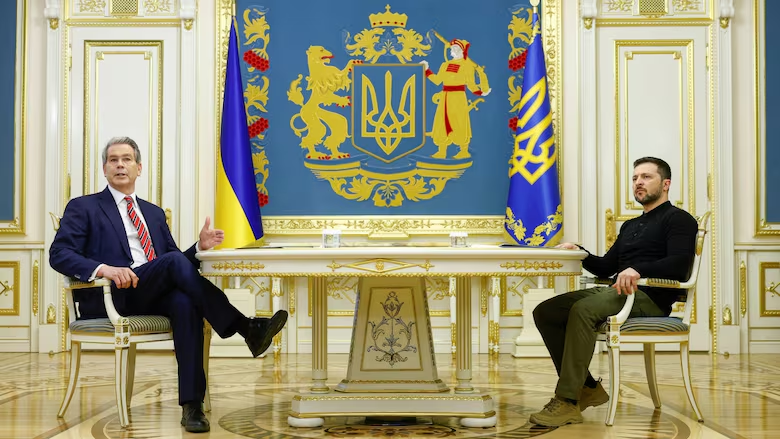Three years of Russian bombs couldn’t break Ukraine. Now, an American contract might.
Since February 2022, Ukraine has defended its land with blood. Now, it must fight for what lies beneath with something just as important: its sovereignty. As Moscow rains bombs, a quieter assault is taking place below, not from an enemy but from an ally. The United States, under Donald Trump, is turning aid into leverage, demanding control over Ukraine’s vast mineral wealth as repayment.
Rescue, it seems, comes at a price -- control.
Discussions over Ukraine’s mineral wealth as part of US aid negotiations began surfacing in late 2024 when President Zelensky met Trump in New York. It wasn’t yet a negotiation, but the seed was planted. By 12 February 2025, Treasury Secretary Scott Bessent delivered a formal draft to Kyiv, one Zelensky rejected for its lack of security guarantees.

Days later, at the Munich Security Conference, Zelensky faced Vice President J.D. Vance and Secretary of State Marco Rubio with a revised version. Still, there was no deal. Then, on February 20-21, Trump’s envoy, Keith Kellogg, arrived in Kyiv with an “improved” offer. Yet the core demand remained unchanged. Kellogg’s “improved” offer still insisted on a 50-year US stake in Ukraine’s lithium mines, a clause Kyiv called "colonial" in private talks.
The imbalance is visible in the numbers alone.
Ukraine’s untapped mineral wealth exceeds $10 trillion, with some of the world’s richest reserves of lithium, titanium, and rare earth elements.
Under the proposed deal, Ukraine would be required to allocate 50% of its mineral revenue to the US until the total contribution reaches $500 billion.
However, Ukrainian officials have rejected this demand, highlighting that the total US aid received amounts to approximately $98.5 billion, significantly less than the $500 billion repayment sought.
President Zelenskyy recently told reporters a day before the third anniversary of the Russian invasion: “I don’t recognize even $100 billion.”
“We agreed with Biden that this was a grant. A grant is not a debt,” he added.
Call it aid if you want, but Ukraine must call it what it is: a heist. Washington isn’t just after half of Kyiv’s minerals -- it’s demanding half its soul, dictating debt terms like a landlord raising rent at midnight.
If Ukraine gives up its economic future now, what stops Washington from demanding more? If aid comes with economic traps today, will future US support come with military conditions? Diplomatic restrictions? Will Ukraine be forced to align every decision with Washington's interests, from trade agreements to foreign policy?
Trump's blackmail sends chilling signal to allies
This deal extends far beyond Ukraine's borders, setting an example that sends signals across the globe.
From Eastern Europe to Asia, countries that have long trusted in America's protection are starting to question where they stand. The Trump administration's deal over minerals reveals a troubling shift, one where alliances seem to come with price tags rather than shared values.
Take Poland, a crucial NATO ally standing guard against Russia, whose coal industry might become a bargaining chip for continued support. Or consider Taiwan, whose vital semiconductor industry, making 60% of the world's chips, could be leveraged against promises of naval protection. The Baltic nations, currently home to 15,000 NATO troops keeping Russia at bay, might find their natural resources turned into bargaining chips for continued defense commitments.
Washington has long criticized China’s debt-trap diplomacy, condemning Beijing for locking nations like Sri Lanka into $8 billion loans for infrastructure, but now pursues a parallel path, Beijing builds ports to bind nations; Washington mines allies to bury them.
Ukraine has already paid the highest price for its sovereignty: its people, its cities, its future. It should not have to pay again in minerals, debt, or economic submission.
Russia's war was never just about territory. It was about Ukraine's self-determination, and self-determination should not come with a price tag.
If Washington’s aid now comes with demands for repayment that far exceed what was given, what message does that send to Ukraine and its allies? That America’s support is conditional? That security partnerships are just transactions?
This deal does not strengthen Ukraine. It weakens it, forcing it to trade away the very independence it has fought for.
A war fought for freedom cannot end in economic servitude. Ukraine’s future must be built on its own terms, not on the debts and demands of those who claim to be its partners.
The Kremlin breaks Ukraine with bombs. Washington would do it with contracts. Kyiv refuses both. Its defiance should remind America of what it once stood for: liberty, not chains. Ukraine is not for sale, and neither is its future.
Editor's note. The opinions expressed in our Opinion section belong to their authors. Euromaidan Press' editorial team may or may not share them.
Submit an opinion to Euromaidan Press

